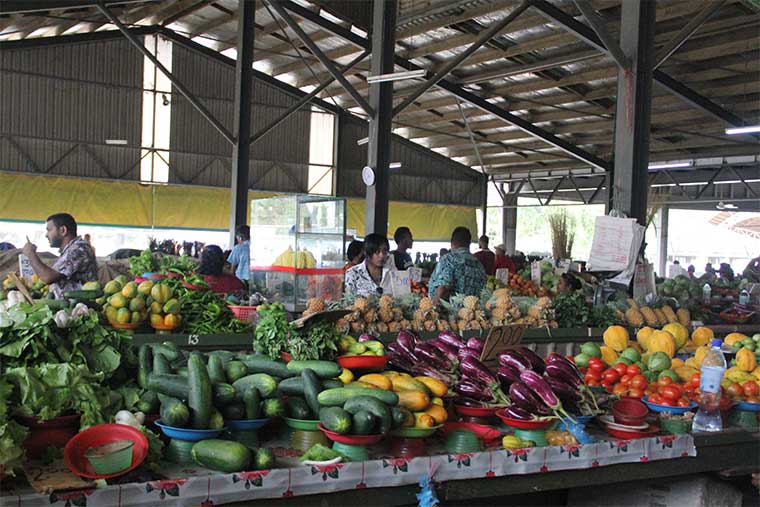
This year, the theme of World Obesity Day on March 4 is ‘Everybody Needs to Act’. With 800 million people living with obesity around the world, the inextricable connection between healthy diets and human rights is undeniable and all of society must act decisively. Applying human rights-based approaches in empowering people to consume healthy diets is critical to drive State action on healthy diets. The Pacific region is showing how the human rights framework can be used to promote healthy diets in the region and at the same time how healthy diets are a human rights issue. By doing so, the region is taking steps to encourage Pacific people to consume healthy diets and avoid cheap and ubiquitous ultra-processed foods. The WHO data showing an estimated 43% of adults in Pacific island countries are obese, a rate more than three times the global average, makes it clear that urgent and sustained State action is required.
The last ten years has seen the Pacific region emerge as a leader in human rights, using human rights to advance issues of concern to the region. In 2019, Fiji became the first country in the region to be a party to the nine core international human rights instruments. The following year, Samoa hosted the extraordinary outreach session of the Committee on the Rights of the Child, the first time a human rights treaty body has ever met outside of Geneva or New York. Fiji and the Marshall Islands have both served on the UN Human Rights Council and the President of the 15 th cycle of the Council in 2021 was Fijian. Drawing on the experience of using human rights arguments in domestic, regional and international forums to advance a range of development issues such as gender-based violence and climate change, the Pacific region is showing encouraging signs of embracing the human rights frameworks in the context of another priority: unhealthy diets, a leading risk factor for noncommunicable diseases (NCDs).
Regional instruments have started to recognise the importance of human rights-based approaches for NCD prevention measures. Despite the main regional instrument on NCDs in the Pacific, the Pacific NCD Roadmap Report adopted in 2014, being silent on the link between NCDs and human rights, since then, NCDs have been addressed as a human rights concern as demonstrated in the 2015 Denarau Declaration on Human Rights and Good Governance which was adopted by 11 Pacific Members of Parliament. In the Declaration, parliamentarians committed ‘to apply a human rights lens’ to the formulation of legislation, recognised the NCD crisis as an ‘unfolding epidemic’ and urged ‘Parliaments to develop conductive legislation, policies and practices’ that address NCD risk factors. That same year, the State of Human Rights Report issued by Samoa’s Office of the Ombudsman and National Human Rights Institution noted that the human rights-based approach to NCDs as an emerging issue.
In addition to increasing recognition that a human rights-based approach to developing and implementing NCD prevention measures, such as healthier diets, helps to advance human rights, Pacific Island countries are also using human rights obligations, instruments and mechanisms to advance healthier diets. Pacific Island countries have been increasingly reporting to treaty bodies on the implementation of States’ obligations under the various international human rights treaties. These reports have focused on a range of issues which are relevant to healthy diets such as nutrition programs, initiatives to promote breastfeeding, NCDs more broadly and food security. While challenges still exist, including that the State reports do not necessarily always accurately represent the situation on the ground, it is promising that healthy diet initiatives are beginning to be at least seen as a human rights issue.

Clare Slattery, Legal Policy Advisor

Daiana Buresova, Regional Manager for the Pacific
The last decade has seen bodies such as the Committee on the Elimination of Discrimination Against Women and the Committee on the Rights of the Child, issuing concluding observations which have included recommended actions to promote healthy diets. For example, in 2012, the Committee on the Rights of the Child recommended the Cook Islands ‘take measures to raise public awareness of the negative health impacts of processed food and establish regulations to restrict and monitor advertising and marketing of junk, sugary and fatty foods.’
Alongside human rights reporting, in the years preceding COVID-19, the Pacific region saw increasing engagement with the Special Procedures of the United Nations Human Rights Council through independent human rights experts. Special Rapporteurs covering themes such as water, health, cultural rights and Indigenous rights have visited the Pacific region. Special Rapporteurs have called for the implementation of policies and laws which fulfil these rights while being context driven. The Special Rapporteur on the human rights obligations relating to the enjoyment of a safe, clean, healthy and sustainable environment highlighted the topic of healthy and sustainable food in his 2020 report on Fiji. This report raised concerns including the shift towards more energy-dense processed foods in Fiji and a dramatic rise in the prevalence of obesity in the country. The report concluded by noting previous recommendations to encourage consumption of traditional healthy foods and regulate imports and advertising of unhealthy snack foods.
Furthermore, at a country level, human rights can also be protected by the inclusion of human rights obligations in domestic constitutions. Fiji’s Bill of Rights as set out in the 2013 Constitution specifically includes the right to adequate food and water and the right to health. To date, neither right has been considered by domestic courts, however, around the world litigation involving similar rights has occurred in relation to other risk factors, most notably tobacco. The inclusion of human rights obligations in constitutions can be an important accountability mechanism which can be used to ensure States meet their human rights obligations.
The Pacific region is setting a clear example of how global human rights obligations, instruments and mechanisms can be used to create domestic and regional action on a leading NCD risk factor: unhealthy diets. This year on World Obesity Day, it is time for everyone to elevate and act on obesity as a human rights issue.